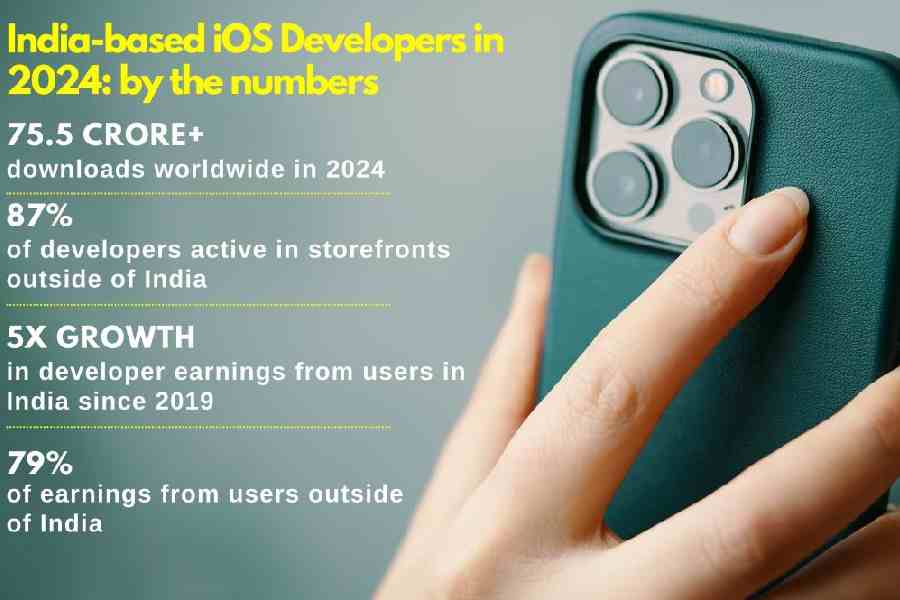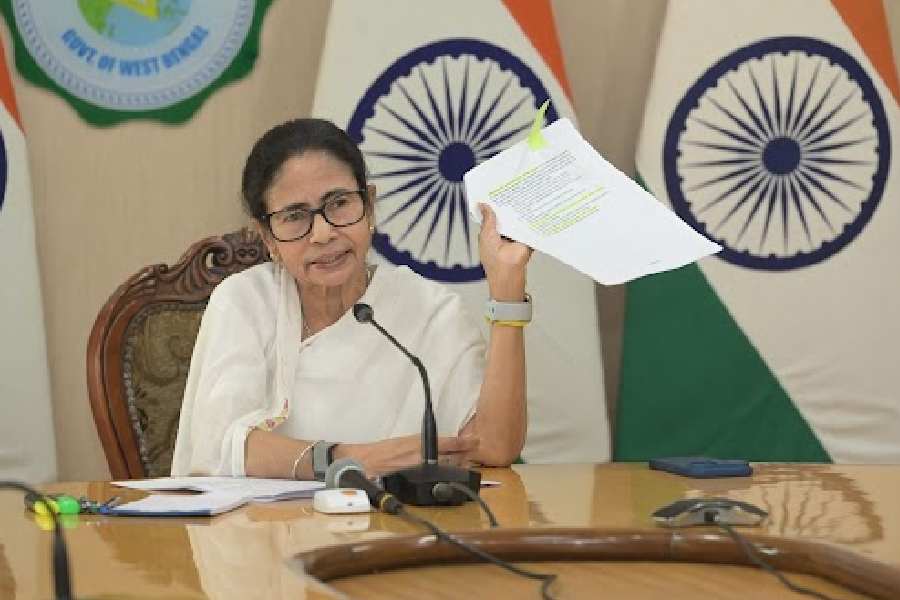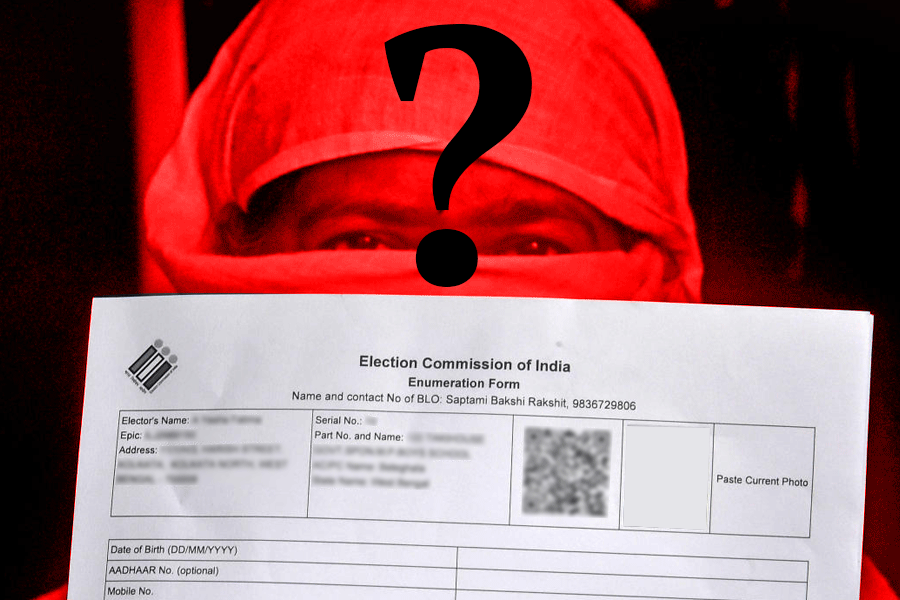For India, the Apple roadmap is unwinding effectively. The company has two retail stores of its own in India — Mumbai’s BKC and Delhi’s Saket — and four more are on the way. That’s one aspect of the success story. What makes iPhone — or any Apple product — special is not just hardware. It is about the integration of specs and software. And that is where developers come in.
Helping Apple are developers, who continue to present new apps that change the way we interact with iPhone, iPad, Mac or Watch.
A new study — published by Apple and conducted by professor Viswanath Pingali from the Indian Institute of Management Ahmedabad — found that the App Store ecosystem in India facilitated ₹44,447 crores ($5.31 billion) in developer billings and sales in 2024.

The total App Store earnings of small developers increased by 74 per cent between 2021 and 2024. Initiatives like the App Store Small Business Programme, designed to support small developers, provide a reduced commission rate for these developers
A high point of the findings is that more than 94 per cent of that commerce accrued solely to developers and businesses of all sizes, without any commission paid to Apple. Further, over the last five years, the global earnings of India-based developers have tripled, underlining the business opportunity and global reach the App Store provides.
The opportunities for India-based developers to reach a global user base through the App Store cannot be overstated. The paper mentions that in 2024, users from the App Store’s 175 storefronts, downloaded apps from India-based developers more than 75.5 crore (755 million) times; 87 per cent of developers in India were active on multiple storefronts and close to 80 per cent of their App Store earnings came from users outside of India.
Professor Pingali’s study brings out the key drivers shaping the App Store ecosystem in India, including increased app usage in sectors like food delivery, travel, gaming, and entertainment. In 2024, App Store developers generated ₹38,906 crores ($4.65 billion) in total billings and sales from the sale of physical goods and services, ₹3,014 crores ($352.9 million) from in-app advertising, and ₹2,527 crores ($302 million) from digital goods and services.
‘Enriching lives’
When Apple opened its online App Store for iPhone in 2008, Steve Jobs knew its importance as the world was moving towards Internet-connected mobile devices. Back then, the store offered more than 500 software applications but over the years, the number surged beyond one’s imagination.
These days, many apps first launch for the Apple ecosystem and then makes its way to Android. It has to do with the support Apple is extending to developers.

From 2020 through 2023, Apple prevented a combined total of over $7 billion in potentially fraudulent transactions
“The App Store has been an economic miracle for developers in India and all around the world, and we’re thrilled to support their work,” said Tim Cook, Apple’s CEO. “This study underlines the power of India’s incredibly vibrant app economy. And we’re committed to keep investing in the success of developers of all sizes as they build apps that make an important impact and enrich people’s lives.”
There is high level of transparency in the App Store’s standard commission structure. The App Store commission structure applies to all developers selling digital goods and services in a given geography in the same way. The default commission rate is 30 per cent, but the vast majority of app developers selling digital goods and services are eligible to pay a reduced commission rate of 15 per cent on sales made via in-app purchases or paid downloads, for example, through the Small Business Programme (since 2021, all new developers and developers who earned up to $1 million on the App Store in the prior calendar year are eligible to qualify for the this programme).
Further, many developers monetise their apps in ways that do not entail Apple collecting a commission, such as selling physical goods and services, or through in-app advertising. According to the study, a large majority of iOS app developers in India do not pay any commission to Apple.
Success stories
The App Store’s ecosystem of innovation provides Apple developers around the world with a global distribution platform across 175 storefronts. In 2024, close to 80 per cent of India-based developers’ App Store earnings came from users outside of the country, and 87 per cent of developers were active on multiple storefronts. Moreover, throughout the same year, users from all over the world downloaded apps from developers in India more than 755 million times through the App Store — twice as many as five years ago. Many apps from India-based developers have also appeared on the most-downloaded app charts in storefronts outside of India, and apps from India-based developers were in the top 100 most-downloaded apps in 70 storefronts outside of India.
The list of developers who make a living coding apps is endless. Entrepreneurs like Rama Krishna, Fluid Touch’s founder, relies on the App Store to expand the reach of his apps. Fluid Touch launched its popular note-taking app, Noteshelf, in 2010, allowing users to minimise distractions. Available in over 150 countries and 10 languages, the app utilises Apple technologies like Interactive Widgets and Apple Intelligence to provide users with well-crafted notes and a customised experience.
“Noteshelf is the preferred note-taking app for millions of users worldwide, and we’re incredibly proud of the business we’ve been able to build on the App Store over the last decade,” said Krishna. “We remain committed to delivering the best experience possible for our users, and through Apple’s vast amount of technologies and resources like the Apple Developer Centre in Bengaluru, we’ve been able to do just that.”
When developers work with Apple, it’s about the ecosystem. It has helped them to reach global businesses as well as audiences across India. In the last five years, downloads from Indian users have more than tripled, and earnings from these users have increased more than fivefold.
Small developers have found plenty of support. The total App Store earnings of small developers increased by 74 per cent between 2021 and 2024.
Lumy, a sun and moon-tracking app, is an example of how local developers are finding success on the storefront. Recognised as a 2024 App Store Award winner, founder Raja Vijayaraman has benefited from App Store to put his app into the hands of more users across the world.
As a solo developer, Vijayaraman utilises a variety of resources to help further his mission, including Apple’s Small Business Program. With support from Apple, he could build new features in Lumy, such as State of Mind, which offers users personalised sunlight suggestions like stepping outside for a break or enjoying a peaceful sunset.
“As a mechanical engineer turned developer, I started from scratch with no coding background or industry connections,” said Vijayaraman. “Apple’s developer resources, design guidance, and powerful technologies like SwiftUI have empowered me to create apps like Lumy, reaching users worldwide. The App Store made it possible for an indie creator like me to turn passion into a sustainable career. It’s heartening to receive emails from people across cultures sharing how my apps improve their daily routines.”
The study mentions that many apps from India-based developers have also appeared on the most-downloaded apps charts in storefronts outside India. In 2024, apps from developers in India were in the top 100 most-downloaded apps in 70 storefronts outside of India.
The need to learn coding cannot be understated. In 1995, Steve Jobs gave a rare interview to Robert Cringely for a PBS special called Triumph of the Nerd. Jobs said: “Everybody in this country should learn how to programme a computer, because it teaches you how to think. It is like going to law school. I don’t think everybody should be a lawyer but going to law school actually is useful because it teaches you how to think in a certain way. In the same way, computer programming teaches you in a slightly different way how to think. I view computer science as a liberal art.”
The App Store also keeps users secure. From 2020 through 2023, Apple prevented a combined total of over $7 billion in potentially fraudulent transactions, including more than $1.8 billion in 2023. The App Store also rejected more than 1.7 million app submissions for failing to meet privacy, security, and quality standards. Features like App Tracking Transparency and Privacy Nutrition Labels have given users more information on how their apps use their data.
App focus
A few apps from India-based developers that have found global success
- Kiddopia: A popular app focused on developing basic language, motor, and social skills in preschoolers in a gamified manner.
- IDZ: The IDZ developer team, focused on early learning apps, has developed a diverse portfolio of apps, including curriculum-based games, imaginary worlds, colouring activities, educational songs, storybooks, and games for toddlers, pre-K, and nursery kids.
- Box Box Club: An app for car racing enthusiasts created by two developers who have seen impressive growth in recent years, Box Box Club integrates key Apple features such as Live Activities, App Shortcuts, widgets, watch complications, and translation tools, to offer users real-time race updates and exclusive content in 11 languages around the world.
- LightX: An AI-powered photo and video editing application that leverages artificial intelligence to provide a wide array of creative tools.
- Gameberry Labs: An award-winning startup developer of app-based classic board games, including Ludo STAR and Parchisi STAR, Gameberry Labs creates apps that help connect family and friends around the world.










